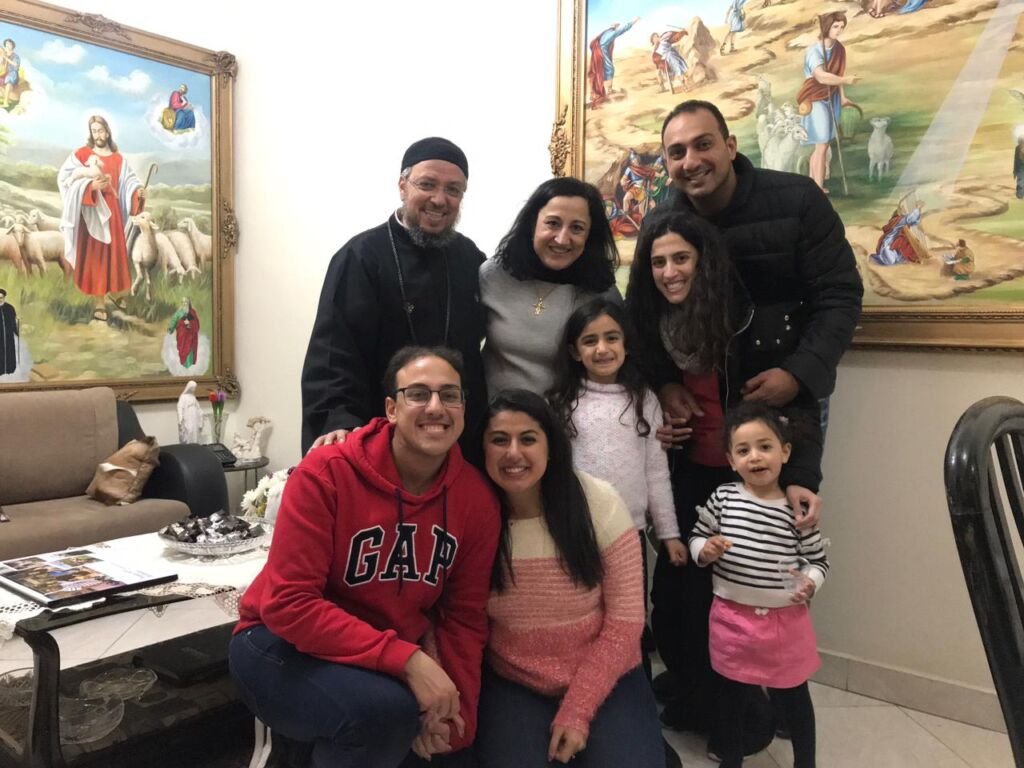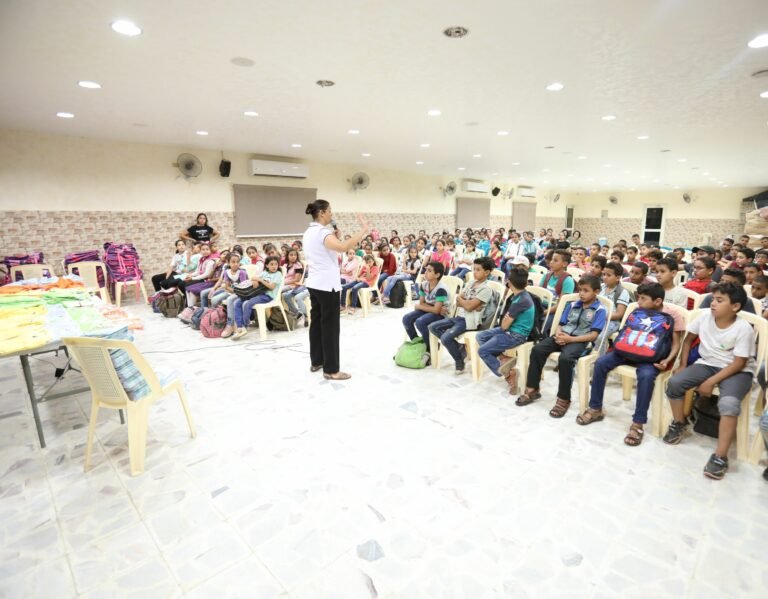What we can learn from other Christian denominations? How did the church survive the pandemic? What is the evangelism service of St. Paul Coptic service? What about Amba Abraam? Who were the public figures that you admired?.
Interviewer: what would you say we can learn from other christian denominations and apply in our evangelism services?
We respect all people; especially we share our beloved Christ with many denominations. So, we look up to many experiences and activities. In some denominations, they succeeded to push the children to love the Bible and to memorize many of the verses. And the Bible became the reference in their minds very early in their lives.
I think that’s one good experience we should take and apply in our school teaching. Another important point, which I already had it in my life, is that we need to think of evangelism of the non-believers, of the outreach, how to witness to Christ, how to be the light of the world.
In our church, this idea is not fixed enough in the minds of even the servants, but in other denominations, they’re always busy with delivering the message to non-believers. Maybe that’s why I started the program of Saint Paul School for evangelism. And in the last 10 years, I’m almost very busy with evangelizing the Orthodox face to many African and Asian countries.
Another good experience in some of the denominations is that they can reach the youth in many good ways, so the youth may be attracted to the activities. And by this, they may start reading the Bible and knowing Christ.
We need to develop new activities and to have this mindset of accepting new ideas and new approaches to the youth.
Yeah. And I think also one approach that the church aggressively pursued over the last two years regarding a way to reach the youth during what happened with the pandemic was of course establishing an amazing online presence

Interviewer: To maintain the church, but of course, in a virtual world who knows, are we going to masses in the Metaverse? Doubt that will happen. But can you tell us more about how the church dealt with the pandemic and how it managed to maintain the sense of community and faith and spirituality in the face of everything?
Yes. The church as a mother felt the responsibility towards her children in this tough time. More than two years of suffering and anxiety, fears everywhere, deaths everywhere. And no one can predict what will happen in the future. So, people were really under the stress of the COVID and complications, and we lost many priests; we lost thousands of servants and deacons.
The messages were mostly about the love of God, how to rely upon God, how to think of eternity, how to be ready to face the beloved face of God, how to serve the poor and needy at that time. And I can tell you that thousands of people were really great in serving the sick people at that time. especially in the poor areas.
they made great efforts to give them the supply of medicine and to give them some food. with the very sick people and the very poor areas. So, the church tried by all means to support the peace of the hearts of the children. and also the needs of the bodies, because medicines were not enough sometimes.
And the hospitals were really tough with the expenses of managing many cases. Therefore, the church supported thousands of her children. Still, we made use of the pandemic as an alarm to tell everyone: we have to be ready. That’s kind of a high voice from heaven that we need to repent. We need to focus.
We need to start thinking of the future life. We need to love each other more. So, the messages of repentance were many.
Interviewer: Yep. It was definitely a tough time. And we go back to evangelism a bit. You mentioned that the school of evangelism that you established, so can you give us more details about what the school teaches and how it’s actively instilling these qualities in youth?
Actually, it started with the motivation and inspiration of His Grace Anba Bakhomious, because Anba Bakhomious was always an evangelist. He loved Africa so much and he lived in Africa for many years. he pushed my weak self to start thinking of serving outside Egypt in the poor countries. So, we started serving in Sudan.
Then, we went to South Africa, and then, we started serving in many countries with many groups of the young people. Then, it came a minute, like we felt we are not empowered with the knowledge of evangelism, how to evangelize, how to deliver the message, because we used to teach them to Christians.
We did not have enough experience with teaching non-believers. with this idea, we started to make the program. So, from that time, Saint Paul School for Evangelism started in Saint Mark, Heliopolis, and it has now many remote classes in America, Canada, Australia, and Europe and also in upper Egypt.
And some of the people may study online courses if they cannot join the classes. So, thousands of graduates graduated from this school, and their mindset is now with the idea of living an evangelistic lifestyle. It’s not just to take the plane and to go travel somewhere.
It’s to live always like a missionary, to have a mission in your heart all the time, to feel the responsibility towards the community you are living in.
So, this idea of having the light of God shining always to everyone is the goal of our programs. Thank God. With this school, we could reach the minute that we ordained by the hands of His Holiness Pope Tawadros more than 30 priests being busy with the evangelism. and also more than 50 dedicated servants who gave their life totally to stay in these countries to serve the name of God and to preach the word of God.
But other graduates are busy supporting these missions in the countries and go for the short missions, medical missions, developmental missions, so many sources of activities are there for the graduates.

Interviewer: And is it open to all age groups?
Yeah, usually from age 15 is accepted, and it’s mostly in English and partially in French for those who speak in French, because we need to use the other languages.
It’s easy to speak Arabic, but outside Egypt that will not help us. . Yeah, so mostly in English.
Interviewer: And is there a way at the moment for aspiring remote evangelists to help out if the Copts abroad living in Australia, Canada, of course, with the logistics of life getting in the way, is there any way they can support the mission?]
It’s always about the heart. When the heart is busy with the mission and is busy with the salvation of others, people will invent what to do, will find out the way, how to help others to know Christ. So, I can tell you hundreds of people started evangelism from abroad online, and some of them are in the remote classes.
And some of them started many good projects in their areas to outreach people and to speak about Christ. And they felt the power of witnessing to the Lord.
Interviewer: And you mentioned earlier that you also focus a lot on community development, So can you elaborate more on how the St Paul Organization supports these underprivileged communities and elevates them?
Okay. The service with the underprivileged areas is called Anba Abraam and on top it started like Saint Paul. So, Saint Paul preaching outside Egypt is taking the same ideas and a mindset of sustainable development to help as one of the approaches or tools in evangelizing the people in the poor countries.
Also, they work together. Anba Abraam service is special for the poor people in Egypt, and it’s like a service of development, community development and also personal development, and Saint Paul is busy with evangelism, but one of the important tools is to apply the same ideas or projects, serving many categories wherever they go.
So, when we speak about the service of Anba Abraam in Egypt, we are always in stand-by for needs’ assessment. Wherever we go, we make an assessment: what exactly the priority is, the needs of this area, and the categories of people.: number of workers, number of people who do not have any chance to work, the illiterate girls, the boys and girls in schools.
Interviewer: And is it open to all age groups?
Yeah, usually from age 15 is accepted, and it’s mostly in English and partially in French for those who speak in French, because we need to use the other languages.
It’s easy to speak Arabic, but outside Egypt that will not help us. . Yeah, so mostly in English.
Interviewer: And is there a way at the moment for aspiring remote evangelists to help out if the Copts abroad living in Australia, Canada, of course, with the logistics of life getting in the way, is there any way they can support the mission
It’s always about the heart. When the heart is busy with the mission and is busy with the salvation of others, people will invent what to do, will find out the way, how to help others to know Christ. So, I can tell you hundreds of people started evangelism from abroad online, and some of them are in the remote classes.
And some of them started many good projects in their areas to outreach people and to speak about Christ. And they felt the power of witnessing to the Lord.
Interviewer: And you mentioned earlier that you also focus a lot on community development, So can you elaborate more on how the St Paul Organization supports these underprivileged communities and elevates them?
Okay. The service with the underprivileged areas is called Anba Abraam and on top it started like Saint Paul. So, Saint Paul preaching outside Egypt is taking the same ideas and a mindset of sustainable development to help as one of the approaches or tools in evangelizing the people in the poor countries.
Therefore, they work together. Anba Abraam service is special for the poor people in Egypt, and it’s like a service of development, community development and also personal development, and Saint Paul is busy with evangelism, but one of the important tools is to apply the same ideas or projects, serving many categories wherever they go.
So, when we speak about the service of Anba Abraam in Egypt, we are always in stand-by for needs’ assessment. Wherever we go, we make an assessment: what exactly the priority is, the needs of this area, and the categories of people.: number of workers, number of people who do not have any chance to work, the illiterate girls, the boys and girls in schools.

And how many of them are doing good in school. So by studying the community, we can start with the project. We have the idea, the vision, the program, and the trainers who can go and train the locals a kind of TOT (training of trainers). so they can develop their community.
Also, we have programs for human trafficking, sexually abused girls and boys, for family development, for the marital relationship, for all aspects of life where we feel these people are suffering because they do not have the knowledge or the skills.
We are just bringing them the knowledge and the skills, so they can live better. And by this way, they will know God more. They will come to the church more because they are now living as real human beings. So with this, many negatives in the community, we can just serve in many ways.
Interviewer: Thank you. It’s a very exciting mission. But what would you say are the needed tools or changes that changes that need to be implemented in the coming years to truly channel this organization’s potential and make a difference?
I wish that everyone in the church focuses on the role of her mission in the world, because most of the Coptic churches are busy with their children, not busy with the whole community, which is not the mindset of the Lord himself.
He came to the whole world. And He sent us to the whole world. So, changing the mindset of the leaders, fathers, deacons, servants that they are not serving only inside the church, but they should serve outside the church. And the services outside the church is like 24 7, but the service in the church is few hours per week.

So that’s the life of real Christians. That’s the main obstacle or the main challenge because it’s not easy to change the set of the mind that they focus differently on the outsiders. And in order to get to this level of mission in life, we need to start like a preparation for servants, for missions everywhere in all dioceses and churches that they have to have special groups busy with the outreach, with the newcomers, with the outsiders.
They should focus and start making projects and speak their language and open the church for them at some time and adopting many of the good things in the community. So people can feel like we are together doing something shared together.
And now we are accepted in your church and let’s study what exactly you’re facing. So we have to have programs. We have to have leaders. We need to get some associations. We started to have NGOs in many African and Asian countries in order to practice and apply these developmental projects by which we can penetrate the whole community and preach the name of the Lord.
So, having these NGOs everywhere facilitate many things. And people accept to come to an association for development, maybe much more. They can go to the church because they do not know what’s a church is like, but for any kind of center for development, they can come easily. Also, we had a movement with the Coptic doctors in the church because we have hundred thousands of doctors in the Coptic church, who are really good doctors.
And most of them have the desire to serve the Lord, but they know nothing but their medicine, their skills as doctors. and we need them so much because most of the countries are really poor in medical services. for any specialist or a physician visiting any poor country. they add a lot and people look up to them because you came just to help us. And you are a rich doctor and we are very poor and you do not take any money and you just love us.
So definitely the God who sent you is the true God. So we have many, many ideas and many dreams and thank God we can feel the grace of God pushing everything.
Interviewer: Yeah. And I imagine also these doctors who would leave their work and would travel to these countries, they would have such a a rewarding feeling. They’d seen the Lord in these patients eyes. And that’s another way to truly seek Christ than serving the more regular ways that they know. Yeah. So, how did then the evangelism service survive under the pandemic and how did it adapt?
Okay. In the pandemic, actually, most of the activities stopped because traveling was not allowed simply, but one of the major tools progressed greatly, which is the digital evangelism, all the platforms of Facebook and sites and Instagram and starting a social media presence for many of these countries in Africa and Asia.
And many of the servants started to help in this field, how to deliver the message online, virtually, because we cannot just go and stay with them, but we can help them from away, from afar. So I think it helped a lot in this field.
Some of the medical missions could go and help in some countries. Some of the residents and local priests could stay in their countries and they helped a lot like our Father, Abouna Mina, in The Philippines. He stayed for one year in the COVID period and he helped many of the poor people living around the church.
And the church grew with the COVID tenfold because of this help and services. Also in Juba, there were like many travels and the progress of the school there was great in the year of the COVID. So with the grace of God, we could see many fruits.
Interviewer: It’s very nice to see how you mention a lot the importance of education, whether it be you reading, you know, not just Coptic authors, but global authors, and the Coptic church is also always promoting this education constantly because, of course, we study the Bible, but we also need to study everything around us.
It’s nice to see the balance. Abouna, we touched briefly now on how social media helped the evangelism service survive during the pandemic. And I think personally even growing up in Egypt, the social media is always, or the internet, the dark web of the internet, is always being seen as a double edged sword in a way.
It’s something you stay away from, but something you need to survive in today’s society. To balance life, work, and a career, you need to have access to a smartphone today. So, tell us more about, from your perspective and your personal experience, how can the church use this tool or christianize the web to its favor?
Definitely, we cannot ignore that the internet may play a dark role in distracting the minds of many people because of the pornography, because of being attached more than needed to the social media.
But, on the other side, actually, it’s like a great chance for any preacher to approach not tens or hundreds, but thousands and millions. So if we make use of this chance, we can serve in a stronger way. Sometimes I say that if Saint Paul was here, actually he will stick to the computer. And as he used to do, he will not sleep, but he will approach the whole world through the internet.
So I could see it’s a blessing, but in the hands of spiritual people, when they focus on their missions, when they focus on getting the right information from the media and sending the right messages to everyone. This is a great mission.
Interviewer: Yes, definitely. And it’s interesting to see how the church utilized it very well over the last years.
Thank God.
Interviewer: Okay. And now, we move on to Abouna Daoud, the public figure. Of course, you’re traveling all the time for conferences. You’re always on calls. You’re always preaching in one way or another. So, can you just tell us more about during your travels who were some of the public figures that you were glad to meet, and tell us more about your encounter with them.
With the chance of traveling, Thank God, I enjoyed meeting many of my dear fathers and bishops of many dioceses in America, Canada, Australia, and Europe. And I got their blessings and their advices and these great men are doing great jobs and great missions to stabilize and support the mission of the Coptic church outside Egypt, in the diaspora.
Therefore, that’s one point. I remember I met Dr. Magdy Yacoub at one of these conferences in New York, and it was my first time to meet him. And he sat just beside me, and we started chatting together and I can tell you how much the Egyptians loved this man.
The Copts were so happy that he came to our conference. It was a spiritual conference and we just invited him: if you have some time, just come and join. And when he came, we stopped everything in the conference just to listen to this great man.
So, he is really a good figure and a great man to look up to. Thank God, I had seen many good people in everywhere, and this is the promise of the Lord that He is having His people everywhere.
And the light of the heaven is there. And many people are really in love with God and we do not know Him more than enough.

Interviewer: And what would you say was the last conference that you attended that you felt was truly making a difference?
In all the conferences, I feel the grace of God and I feel the acceptance of people and the positive attitude of the listeners. And I enjoy actually seeing the tears in the eyes of the repentant people, because I know this is the best minute in heaven that all the heavenly powers are happy with the repentance of any single person.
So in all the conferences, the most important goal is to move the hearts of people and to repent and start loving God and start changing their life.
Interviewer: I think it’s also fair to say that the church has changed so much over the last, not decades, but centuries. You know, as you mentioned, if Saint paul was here now, things will be very different.So today of course, the Coptic church is not just a building. It’s even as simple as a Facebook account that you follow that has Bible verses. It’s the conferences that you attend. So how do you see the 21st century Coptic church?
I could see the Coptic church is global, universal, and have a responsibility towards the whole world, preaching the sound, traditional, old, and pure face of Christianity and giving the role models before the eyes of all people living on Earth. So, I could see that the church is booming and flourishing and will bring more and more fruit.
Interviewer: Definitely. So, Abouna, I think people always have this annoyance with the term Orthodox; they think strictness; they think lack of flexibility and lack of progressiveness. So, what can you tell us about what it means to have faith in an Orthodox church, and how that has evolved over the last centuries? Of course, but more recently over the last decades in your eyes.
Okay. Being Orthodox does not mean just to go back in time or to be retarded or to be very conservative or to be old in your mind? No, it has nothing to do with this. It’s the purest faith. It’s the faith lived by the church, by the saints.
It’s the sound way of worshiping God; it’s the straight way to heaven. So, if we understand the Orthodox faith in its right meaning, we will all love to be Orthodox.
It’s simply to be real Christians, according to the Bible, according to the life of the saints, according to the guidance of the Holy Spirit. Because when you study the history of the church, there was just one Christian Church.
There were no denominations, but all the church people were Orthodox simply in our meaning. And they were worshiping God the same way we are worshiping Him now. There were liturgies; there were fasting periods. There were intercessions. They were in love with St. Mary. They were always ready for martyrdom.
So, this life of the church is the Orthodox life. That’s what we are busy about, or we call people to live in. So when you study history and you study the doctrine and you study the Bible, we can just come out with the idea that we are living Christianity, as exactly meant by the Holy Spirit, because the teaching of Christ could be understood or applied in many different ways.
The interpretation may play a great role in changing the truth where the reference is not only the verses of the Bible, but how the old saints understood the verses and lived by the verses. So it’s not about the literal words of the Bible, because by doing so, anyone can apply it in different ways and can make many lies as part of the truth.
By studying the lives of the saints, the teachings of the forefathers of the church, lives of the historical senates and meetings and gatherings of all the patriarchs and the bishops in the early days, you may know that in the first 450 years, there were no denominations.
So, we consider that all the church at that time for 50 years were just Orthodox. So, we belong to this period. We are continuing the same life as lived by these people, and we are not retarded. We can change things related to the culture, to the language, to today’s life.
But we can never change anything in the truth. The truth will stay as truth.
Interviewer: So, in our journey to live this truth, this Christian Orthodox truth, which is of course filled with ups and downs in today’s life, do you have a certain Bible verse that helps you live your truth that you can share with your audience and a final message to support and to advise everyone on how to attempt to succeed in living the Christian Orthodox truth.
I cannot just summarize the whole truth in one verse of one meaning, but I’m always busy with the idea of love because our Bible is about love. God is love. Our mission is love.
The great commandments are to love God and to love your neighbor as yourself. So, it’s not even just like a verse. It’s a word. Just keep yourself in love. Live the life of love all the time.
Interviewer: Thank you. That that’s a beautiful way to end it. And thank you so much for your time today. It was very insightful to see how your journey from Bassem to Abouna Daoud Lamei and how you see the world and how you can help us see it also a bit better. Thank you.
Thank you so much.




